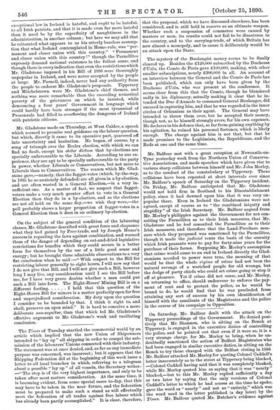On the subject of the general condition of the labouring
classes, Mr. Gladstone described with great force and eloquence what they had gained by Free-trade, and by Joseph Hume's success in repealing the laws against combination, and warned them of the danger of depending on cut-and-dried legislative restrictions for benefits which they could secure in a better form for themselves by the use of a little good sense and energy ; but he brought these admirable observations to a very flat conclusion when he said :—" With respect to the Bill for restricting labour generally to eight hours, I will now say that I do not give that Bill, and I will not give such a Bill, however long I may live, any consideration until I see the Bill before me, for I have very grave doubts whether a man could put such a Bill into form. The Eight-Hours' Mining Bill is on a
different footing I hold that this question of the Eight-Hours Bill for miners is a matter perfectly open for free and unprejudiced consideration. My duty upon the question I consider to be bounded by that. I think it right to, and shall, preserve an open mind." It is hard to conceive a more deliberate non-sequitur, than that which led Mr. Gladstone's effective argument to Mr. Gladstone's weak and vacillating conclusion.






































 Previous page
Previous page